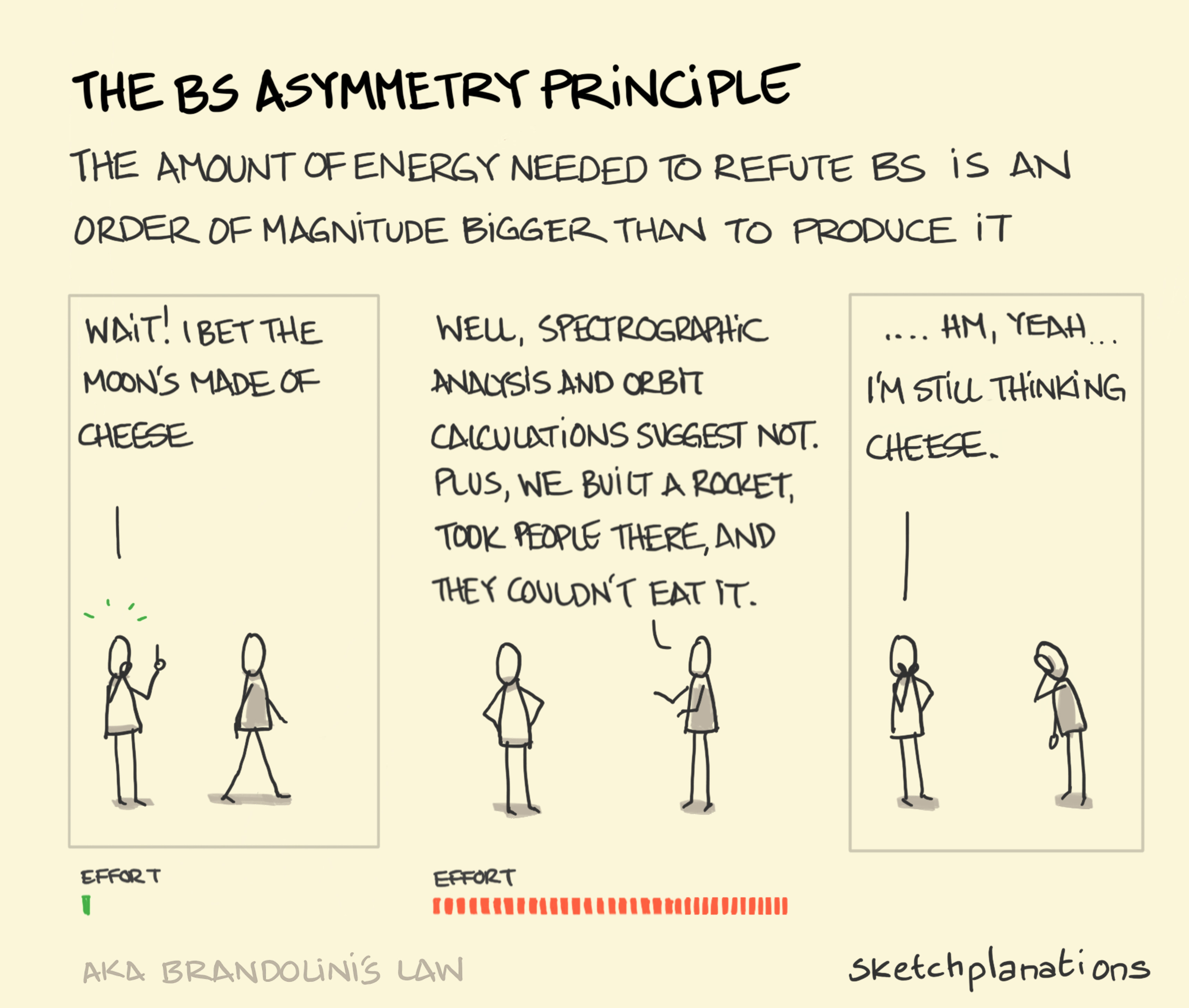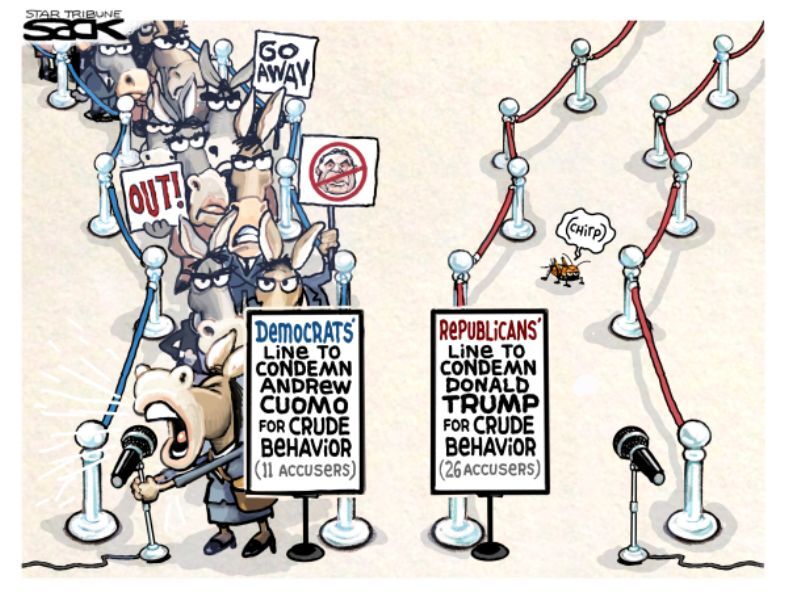To state the obvious: There was no good way to lose Afghanistan to the Taliban. A better withdrawal was possible — and our stingy, chaotic visa process was unforgivable — but so was a worse one. Either way, there was no hope of an end to the war that didn’t reveal our decades of folly, no matter how deeply America’s belief in its own enduring innocence demanded one.
- Ezra Klein, "Let's Not Pretend That the Way We Withdrew from Afghanistan Was the Problem"
This week's featured post is "Power Move", a review of Charles Blow's book The Devil You Know.
This week everybody was talking about Afghanistan

Tomorrow is President Biden's deadline for getting American forces out of Afghanistan. The US announced yesterday that it was ending its airlift of Afghans from the Kabul airport. It estimates that about 250 Americans are still to be removed, plus the forces protecting the airport, and that around 280 Americans have decided to stay for now. (Don't ask me what they're thinking.) 117,000 people, most of them Afghans, have been airlifted out of Afghanistan since August 14.
The Taliban has largely cooperated with this effort, but a suicide bomber from a rival Islamist group, ISIS-K, killed 180 people outside the airport Thursday, including 13 members of the US military. An American drone strike destroyed a suspected car bomb Sunday; at least nine civilians died in the explosion. Rockets were fired at the airport today, but no casualties were reported.
The reason there's no featured post about Afghanistan this week is that I can't improve on what Ezra Klein said.
As I discussed last week, it's been maddening to watch so many of the architects of this 20-year disaster go unchallenged on TV while they pretend the only problem is the "competence" of the Biden administration. Apparently, everything would be fine if Biden had just kept the war going for a while longer. And even if he had to end it, there was some clean and clever way to get all the right people out before the roof fell in.
Klein isn't buying it:
American policymakers and pundits routinely try to rescue the reputation of bad ideas by attributing their failure to poor execution. ... Focusing on the execution of the withdrawal is giving virtually everyone who insisted we could remake Afghanistan the opportunity to obscure their failures by pretending to believe in the possibility of a graceful departure.
... I will not pretend that I know how we should have left Afghanistan. But neither do a lot of people dominating the airwaves right now. And the confident pronouncements to the contrary over the past two weeks leave me worried that America has learned little. We are still holding not just to the illusion of our control, but to the illusion of our knowledge.
He points out something I don't hear anyone else saying: Afghanistan is an example of too much bipartisanship, rather than too much polarization.
At least for my adult life, on foreign policy, our political problem has been that the parties have agreed on too much, and dissenting voices have been shut out. That has allowed too much to go unquestioned, and too many failures to go uncorrected. It is telling that it is Biden who is taking the blame for America’s defeat in Afghanistan. The consequences come for those who admit America’s foreign policy failures and try to change course, not for those who instigate or perpetuate them.
The bipartisan trust in American power and good intentions leads us to imagine that our intervention can only do good, and that any part of the world that captures our attention will benefit. But Klein quotes Ben Rhodes' observation that Afghanistan, Iraq, Yemen, Somalia, and Libya are all arguably worse off than when we stepped in.
This is the deep lacuna in America’s foreign policy conversation: The American foreign policy establishment obsesses over the harms caused by our absence or withdrawal. But there’s no similar culpability for the harms we commit or that our presence creates. We are much quicker to blame ourselves for what we don’t do than what we do.
And finally, our fixation on military power causes us to overlook the non-military ways we could help others: We could aggressively vaccinate the people of poorer countries against Covid-19, or fight the perpetual plague of malaria. We could open our doors to refugees fleeing oppression. We could build schools. And we could do it all at a fraction of the cost of fighting a war.
If foreign-policy bipartisanship was to blame for getting us into Afghanistan, it's gone now. Republicans have taken any cheap shots at Biden they could find, including calling for his resignation after Thursday's suicide bombing.
Political leaders used to unite behind the president during foreign crises. (Recall the post 9-11 consensus, when President Bush's approval briefly went over 90%.) Even moreso, former presidents used to avoid direct criticism of their successors. With that in mind, it's hard to know how to respond to Trump's current shamelessness. We expect it by now, so it's not news. And yet, ignoring it doesn't seem right either.
This week, Trump and his people have been doing everything they can to distance themselves from their own Afghan policy. Biden, after all, is just carrying out the agreement Mike Pompeo signed with the Taliban. If Biden's withdrawal seems too abrupt, Trump wanted to leave even more abruptly: Last October he called for all our troops to be home by Christmas.
Now, of course, Trump is imagining that he would have handled all this differently. Not only would everyone have gotten out safely, without leaving any equipment behind, but we wouldn't have given up the Bagram Air Base at all. "We would have had Bagram open because we always intended to keep it. ... We should have kept Bagram because Bagram is between China. It has total access to China, Iran, and Afghanistan."
Trump's immaculate withdrawal plan is like his "beautiful" healthcare plan that would have covered everyone and been better and cheaper than Obamacare. It exists only in his fantasies, and in the minds of his gullible followers.
Remember: When Trump pulled our troops out of Syria, he didn't rescue any of the Kurds who had helped us. He left equipment behind and abandoned bases which were then occupied by the Russians.

When you heard about Rep. Seth Moulton's quick trip to Afghanistan, you may have thought, "I wonder if his constituents understand what that was all about." Answer: No, we don't. We also didn't know what he was thinking when he ran for president or tried to oust Speaker Pelosi. My best theory is that some oracle once told him he had a grand destiny, and he's been acting on that assumption ever since. But he should have gotten a second opinion.
and the pandemic
The summer surge of new cases continues to round off, as if approaching a peak. The two-week increase is now 20%, compared to 36% last week and over 60% the week before. The total number of Americans hospitalized is now over 100K, and still rising at the rate of 24% over two weeks. 30K of those are in either Florida or Texas, whose governors seem to be doing everything they can to help the virus spread.
Deaths are averaging just under 1300 per day, with about 450 in Florida or Texas. The death toll from the beginning of the pandemic is 637K, a number that resembles a major war.
The question now is whether the start of school (and the filling of college football stadiums throughout the land) will give the surge a new boost. Consider this anecdote from California:
An unvaccinated elementary school teacher who took off their mask to read to students ended up infecting more than half of them last May -- and they went on to infect other students, family members and community members ... In the classroom of 22 students, 12 became infected -- including eight out of 10 students in the two front rows.
Examples like this point out the common sense behind masking: If some barrier had just slowed down the virus particles coming out of the teacher's mouth, maybe at least the kids in the second row would have been safe.
But why mask or vaccinate when you can use a "miracle cure" intended for farm animals? The ivermectin craze has really gotten out of hand. It's always hard to get reliable estimates of the number of people who try an underground remedy, but it looks like a lot of folks.
A recent study examining trends in ivermectin dispensing from outpatient retail pharmacies in the United States during the COVID-19 pandemic showed an increase from an average of 3,600 prescriptions per week at the prepandemic baseline (March 16, 2019–March 13, 2020) to a peak of 39,000 prescriptions in the week ending on January 8, 2021.1 Since early July 2021, outpatient ivermectin dispensing has again begun to rapidly increase, reaching more than 88,000 prescriptions in the week ending August 13, 2021. This represents a 24-fold increase from the pre-pandemic baseline.
And that's just the people who are getting the human version. (Ivermectin has a legitimate use as an anti-parasitic drug; that's probably what the pre-pandemic 3,600 prescriptions per week were.) The drug is also sold as a de-wormer for farm animals -- and it's flying off the shelves.
Many feed stores across North Texas told WFAA they are sold out of ivermectin. [farm store operator Matt] Meredith said his supplier told him they can't get it for him. “Nobody’s got it,” Meredith said. “You can’t even order it online.”
Poison-control centers in Texas say their ivermectin calls have more than quintupled. That's probably because:
The drugs produced for humans are different than the drug made for livestock, which is "highly concentrated and is toxic to people, and can cause serious harm," the Mississippi State Department of Health said in an alert Monday.
If it has never occurred to you to dose yourself with some veterinary concoction, you may wonder what this is all about. Simply this: right-wing stupidity. Apparently, the people who think vaccines are unsafe and masks are a Marxist plot also think "Good old pig de-wormer. What harm could that do?"

The thought that ivermectin could have some use against Covid is not crazy in itself. The drug has anti-viral effects in a petri dish, but unfortunately tests on people haven't panned out.
A quick look at this data suggests a reason why: The doses and concentrations necessary for antiviral activity are much higher than are safe for humans, and would be toxic to human life as well as viruses. If this sounds familiar it’s because the same misapplication of in vitro science has been used to promote hydroxychloroquine and disinfectants like bleach.
Funny that this article mentions hydroxychloroquine. The same group that pushed hydroxychloraquine -- American's Frontline Doctors (though their "About Us" page just mentions one doctor: founder Simone Gold; I don't know who those other white-coated people are) -- started pushing this too. Then Fox News chimed in, and Senator Ron Johnson, and the usual collection of know-nothings that your cousin Jerry follows on Facebook. And now people are stealing drugs from their sheep.
If there's one thing conservatives hate, it's when liberals imply that they're stupid. But you know what? Liberals don't do stupid shit like this. We just don't. Back in the early days of the pandemic, we acted out our panic by wiping down our groceries before we put them away. It turned out to be a waste of effort, but at least it didn't hurt anybody or stop us from doing sensible things too. I've never heard a Democrat say "I don't need a vaccine, because I wipe down my groceries."
So if you're the kind of clear-thinking Republican who doesn't like being lumped together with these yahoos, let me point something out: Hillary Clinton warned you. The point of her infamous "deplorables" speech was never that all Trump voters were deplorable. (Fox News turned it into that, but that wasn't what she said.) That speech was targeted at people like you, and the point was: Look who you're associating yourself with. In another 2016 campaign speech, she quoted a Mexican proverb: “Tell me with whom you walk, and I will tell you who you are.”
So look at the horse-paste eaters, you smart, sophisticated Republicans. Those are your people.
Matt Yglesias calls attention to some interesting data from the Federal Reserve: Restaurant sales are now above pre-pandemic levels, but restaurant employment is still below pre-pandemic levels.
and the hurricane
Ida hit the Louisiana coast yesterday on the 16th anniversary of Katrina. CNN covers this kind of news much better than I do.
and the Supreme Court
As it had signaled it would do, the Supreme Court tossed out the Biden administration's attempt to extend the pandemic eviction moratorium. The ruling doesn't address the questions of whether a moratorium is a good idea, or is constitutional. It just disputes that existing law gives the CDC the power to declare one.
The Government contends that the first sentence of §361(a) gives the CDC broad authority to take whatever measures it deems necessary to control the spread of COVID–19, including issuing the moratorium. But the second sentence informs the grant of authority by illustrating the kinds of measures that could be necessary: inspection, fumigation, disinfection, sanitation, pest extermination, and destruction of contaminated animals and articles. These measures directly relate to preventing the interstate spread of disease by identifying, isolating, and destroying the disease itself. The CDC’s moratorium, on the other hand, relates to interstate infection far more indirectly: If evictions occur, some subset of tenants might move from one State to another, and some subset of that group might do so while infected with COVID–19. ...
We expect Congress to speak clearly when authorizing an agency to exercise powers of “vast ‘economic and political significance.’ ”
I'm not in the habit of agreeing with the Court's conservative majority, but I think they've got a point here. A year and a half into the pandemic, Congress has had plenty of time to either declare a long-term eviction moratorium itself, or to delegate that power to the CDC or some other agency. It hasn't done so. The problem here isn't the Supreme Court and it isn't the Biden administration. As I've observed before, the dysfunction of Congress forces the other two branches to over-reach.
When considering an executive branch claim of power, it's worth asking this hypothetical question: How would I feel about this power in the hands of an administration I didn't like? If the CDC has broad authority to do whatever it finds necessary to deal with a public-health emergency, could a Trump-appointed CDC head have used that authority to, say, cancel the 2020 elections? I'm not sure, but the possibility creeps me out.
Also, we tend to think of landlords as rich corporations, and probably the owners of most rental properties are. But a lot of landlords are middle-class people who have a large chunk of their net worth invested in properties they rent to one or two households. (I live in an apartment attached to the back of a friend's house. My wife and I are their only tenants. After moving to town when I was a toddler, my parents rented out the house on their 160-acre farm.) A nationwide eviction moratorium does a lot more than just stick it to the fat cats.
This week's second important case concerned the Trump administration's remain-in-Mexico plan for people seeking asylum at our Southern border. I've thought it was always questionable whether that policy really meets our treaty obligations to give refugees a hearing, but that wasn't the issue here. The Biden administration has tried to end the program, but the State of Texas sued to keep it in place. Technically, the policy has been on hold anyway since March, 2020, due to Trump administration Covid restrictions at the border.
A district court granted Texas an injunction, keeping the policy in place while the legal process plays out. The administration asked for a stay of that injunction, and the Court denied it. The denial is just a paragraph, so there's not a lot to go on here. Vox tries to flesh out what it all means, but comes to the conclusion that the decision makes no sense.
but I want to tell you about a book
The featured post reviews Charles Blow's recent The Devil You Know: a Black power manifesto.
and you also might be interested in ...
The House Select Committee investigating the January 6 insurrection is taking an aggressive approach. Wednesday it asked for documents from eight federal agencies. The word "sweeping" appeared in many articles about the requests, which centered on "archived communications from the Trump White House". The Committee is also seeking records from Facebook and Google "on policy changes social media companies made, or failed to make, to address the spread of misinformation, violent extremism and foreign influence, including decisions to ban content."
We don't know yet whether anyone is going to fight these orders, and if so on what grounds.
The effort to sanction lawyers who filed baseless lawsuits in support of Trump's Big Lie continues. Wednesday, a federal judge in Michigan ruled against seven Trump lawyers, including Sidney Powell and Lin Wood.
[US District Judge Linda] Parker is ordering the lawyers to reimburse the attorneys' fees that the city of Detroit and Michigan state officials paid in seeking the sanctions. The lawyers must also take legal education classes, the judge said, and she is referring her decision to the Michigan Attorney Grievance Commission, and "the appropriate disciplinary authority for the jurisdiction(s) where each attorney is admitted," for potential disciplinary action.
Rudy Giuliani has already had his license suspended in DC and New York.
The gist of the judge's opinion is that the lawyers made claims their affidavits didn't support, failed to vet their affidavits for credibility, and made false claims about the laws they were invoking. Judge Parker wasn't buying the lawyers claims of ignorance about the complaint they signed their names to or the flimsiness of the evidence they provided.
Plaintiffs’ counsel may not bury their heads in the sand and thereafter make affirmative proclamations about what occurred above ground.
... Although the First Amendment may allow Plaintiffs’ counsel to say what they desire on social media, in press conferences, or on television, federal courts are reserved for hearing genuine legal disputes which are well-grounded in fact and law.
The officer who shot Ashli Babbitt revealed his identity for the first time and did an interview with NBC's Lester Holt.
Babbitt, the only person killed by police during the January 6 riot, has become the Horst Wessel of the violent Trumpists. Her shooting was captured on video, so there is no doubt what happened. She was part of a violent mob trying to break down a door to get into the House chamber, where many congresspeople were still present. Officer Michael Byrd was behind the door with gun drawn and clearly visible through the glass, when the window was broken and Babbitt began to climb through.
But Trump called the shooting a "murder" -- so much for "Back the Blue" -- and Babbitt is considered a martyr for the Trumpist cause.
Byrd argues that the shooting saved lives, which seems obvious to me.
The Boston Globe's list of the 25 best TV episodes of the 21st century is a conversation starter. Your list may differ, but the main thing I gleaned from their list was an appreciation of just how much amazing TV there has been these last 21 years. I can't think of any TV series from my youth that could compete with "The Wire", "Mad Men", "The Americans", "Game of Thrones", or "The Sopranos".
One federally funded Covid program makes the "seamless summer" school lunch option available year-round. Rather than paying for free lunches for low-income students, the government offers free lunches to everyone. The program has a variety of goals, mostly relating to the unpredictability of food insecurity during the pandemic, but one effect is to remove the stigma of free lunches. You don't have to announce that you're poor in order to get one.
408 school districts in Wisconsin are eligible for the program, and one is opting out. Waukesha wants to go back to a system where 36% of kids get free lunches and the rest don't.
Karin Rajnicek, a school board member, said the free program made it easy for families to “become spoiled.” Darren Clark, assistant superintendent for business services, said there could be a “slow addiction” to the service.
As a taxpayer, I suppose I ought to be horrified that some hedge-fund manager's kid might be eating free fish sticks or sloppy joes on my dime. Strangely, I'm not.
and let's close with something timely
The Holderness Family's music parodies have been a great help in staying sane during the pandemic. As a body of work, their songs express the mood swings of an ordinary family muddling through a historically difficult time. This video makes Katy Perry's "Firework" the platform for a rant against the paperwork parents have to fill out if they want to get their kids back into school.
And if you've forgotten what school at home was like, there's a video for that too, based on Barenaked Ladies' "One Week".











